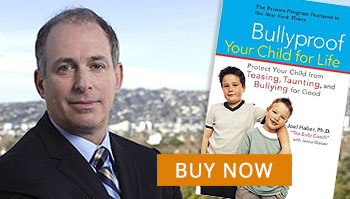
Copyright: lightfieldstudios / 123RF Stock Photo
The Bully Proofing Prescription:
Phase One: Recognize – Continued
Before we move onto how to talk to your children about bullying, let’s talk first about the differences between how boys and girls handle a bullying conversation.
The Differences when speaking to boys and girls about bullying
Boys are generally more sensitive than girls about exposing weaknesses in themselves and may be reluctant to do it, so before having one-to-one conversations with them, make sure you let them know that it’s okay to talk without fear of being in trouble.
If you approach your son with any hint of a negative tone, he’ll likely shut down. Even if he was victimized, he may feel guilty about not being able to handle it himself, or he may worry that you’ll yell at him for any actions he has taken so far (like striking back or calling the bully names).
He may feel inadequate and worry that you’ll ridicule him for failing to solve the problem. He may not want to tell you that the teacher yelled at both of them for fighting—even if your son was innocent. Let boys know that even if you suspect they may be having problems, or getting into trouble, you trust them, and that even if they messed up, it will be okay.
Boys don’t want to show vulnerability, so they may use anger or bad behavior to cover up feelings of frustration or vulnerability.
Girls need to feel valued before they will open up, and the best way to demonstrate that is by telling them something that you admire about them: You really like the way she can be a friend, or kind to her sister or brother. Let her know that you value her and that you know she is a good person.
When bullying is verbal or relational, girls don’t always call it “bullying” and may not expect you to take it seriously, even if it’s consuming her thoughts. Exclusion and meanness may be part of what she thinks is normal. This is why it’s important to tell her that you do want to hear her experiences and will believe her and take them seriously.
When you ask a girl questions, she may avoid answering by taking the “avoidance” way out, saying, “I don’t know.” This is really an excuse to get out of a conversation, so tell her, “I know if you take some time and think about it, you can come up with something.” This doesn’t allow her to get off the hook so easily and shows her that you care about these issues and won’t avoid them yourself.
How to Talk to Your Child About Bullying
The way you approach the subject will differ depending on whether you’re talking to a boy or girl, and what age your child is. In the following sections, you will find your child’s gender and age, and the particular approach that will be most effective.
Up to Second Grade
With younger children, you need to take the lead in terms of managing the situation. It’ll be up to you to give your child the language: the right things to say to the bully, or the right behaviors to use. It’ll also be up to you to speak with teachers or the principal if the bullying continues.
Don’t expect your child to formulate a plan at this point, or to have many worthwhile suggestions about what to do about the problem.
They’re looking for your reassurance that everything is going to be okay, and they get scared if you overreact. Think about the toddler who falls down, but looks to the parent before reacting. The child falls, then checks to see what the parent does—if the parent looks horrified and yells or rushes over to sweep the child up, the child cries. If the parent smiles and says, “Oops!” or something similar, the child is less likely to cry and more likely to pick himself up and keep going. In both cases, the child isn’t actually hurt, but maybe just a bit shaken, and he doesn’t know how to feel, so he tries to figure it out based on how you feel. If you’re freaked out, then he knows to be upset!
Third Through Sixth Grade
This is when concrete thinking and cognitive development improve, and kids are more able to begin making sense of their own power in relation to others. Therefore, this is the time to include them on brainstorming sessions to come up with a plan to address the problem. It’s good to ask, “What do you think about this?” or “How about if we try that?” or “Do you have any ideas for what you could say if he picks on you again?”
Confidentiality is more important at this stage, so if you talk to school, camp, or sports officials, make sure they know that they are not to inform the bully or anyone else that you or your child “tattled.” “Reporting” problems is a much more useful word here, and that has to do with getting kids into a situation that helps them feel emotionally and/or physically safe and out of danger.
This is the age where school avoidance becomes more common, so you need to make sure you’re working on teaching your child skills to be resilient against school bullies before the problem gets severe. If you simply rush to the school to get the bully punished, your child hasn’t learned how to deal with the problem in the future. Use lots of role-playing and examples to talk through the types of incidents your child may face and how to react.
Seventh Grade and Beyond
Kids at this age are watching your reactions very carefully— they’re noticing your body language, your tone, your words, and whether or not they match each other. If they feel like you’re judging them at all, or that you don’t “get it,” or that you’re overreacting, it’s over. So one good tactic to use early on is to relate your own experiences with bullying to let your child understand that you’ve been there and done that.
You don’t need to go on at great length, but try to come up with a similar situation you remember from your own youth when you or someone you cared about was targeted by bullies, and validate your child’s feelings by talking about how it made you feel at the time—humiliated, scared, lonely, stupid, whatever. Help your child normalize the experience. Many teens and preteens already feel like outcasts; being the targets of bullies just makes that worse. If you can make it safe to relate to you and let them feel like they’re not alone in their experiences and feelings, it’ll be much more likely that they’ll realize you’re someone they can come to when they need to talk.
Keep in mind that they care more about what their peers think at this point than what you think, and that’s developmentally normal. Even so, however, they still want your support. You have to take a backseat unless the situation has escalated to a major safety concern, but be there to talk and to help the child figure out what to do.
The last thing your child wants at this point is for you to make her feel like a totally powerless loser, which is just what you’ll do if you rush in to save the day against her wishes. It’ll make her think that even you think she’s weak and helpless. If she already feels like her peers don’t respect her, it could be really depressing for her to believe that her parents don’t, either. Even if she doesn’t succeed at figuring out what works right away, it’s a better strategy to just keep listening and offering suggestions rather than trying to handle the situation for her. And if nothing you say helps, just say, “We’ll keep working on this until you come up with away that helps.”
In my next post, I’ll talk about the right questions to ask.
Until then, feel free to drop me a line if you have any questions.
Dr. Haber
